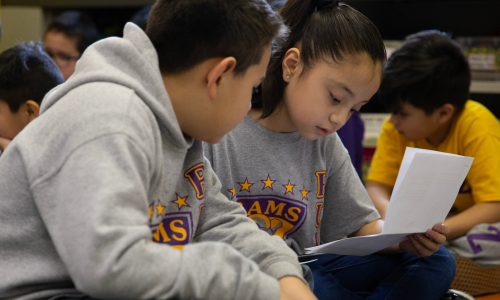
Dr. Andrew Hegedus, Research Consulting Director for NWEA recently completed a noteworthy research study exploring the relationship between poverty and school performance. We caught up with Andy to discuss the origins of the study, implications for educators, and where his research is headed next. His responses were edited for length and clarity.
How did you first become interested in studying school performance?
I worked in a school district as a senior administrator in Delaware for six years. One of my favorite schools was right next to our district office in downtown Wilmington, a tough, urban area. I loved that school, loved the principal, loved the kids, loved the teachers. They were on it. You’d go into the classrooms, and kids were learning. It was really impressive. And then I’d go to this other school near my house out in the ‘burbs with all of these university professors’ kids and not much was happening. Kids were well behaved but that was about it.
In the span of a year or two, the school in the suburbs got Blue Ribbon status and the school near the district office that I loved got labeled a focus school. The principal was relocated. 50% of the teachers were reassigned. Everybody had to interview for their jobs again. Those were pretty severe consequences and that made no sense to me because of what I saw in the building.
That memory was always in the back of my mind: What is the relationship between poverty and school performance? When I came to NWEA, I thought “This would be an interesting question to pursue.”
When it comes to tackling such a big question, where do you start?
I started digging into it and found that NWEA is essentially the only organization in the world that has the data to answer this question really well. Because we measure all kids accurately, we know how well low-achievers are performing and how well high achievers are performing when it comes to both achievement and growth. And our norms are explicitly designed to compare across subjects and across grades so you can aggregate them at school levels.
I ran the numbers on poverty and achievement. There’s a strong relationship there, and it’s widely known. However, there’s a weak relationship between poverty and growth. It means you’ve got some high poverty schools that grow kids a lot and you’ve got some high poverty schools that don’t. You’ve got some wealthy schools that grow kids a lot and you’ve got some wealthy schools that don’t. That answer made perfect sense, right?
What is the impact of prioritizing achievement when it comes to school performance?
It has a huge, personal impact. It’s not just personal for the principals and the teachers, it’s personal for the kids and the families. And that’s the real issue. These schools are serving our most disenfranchised, most vulnerable populations. If you have one of these high-poverty, good schools, like the one I saw back in Wilmington, you want these relationships to stick. If a policy is measuring the wrong thing and all of the sudden a good school that has built up these relationships is told, “You’ve got to restructure. You’ve got to transform. Someone else is going to manage you now, ” then that blows up all of that good work which can’t be good for kids.
Is evaluating schools solely on growth the answer?
No, not necessarily. Achievement is very important. Making sure that third-graders are on track to read, making sure eighth-graders are on the path to go to a four-year institution if that’s what they want. Achievement needs to be communicated; it’s needs to be part of the conversation.
When it comes to balancing achievement with growth to evaluate performance, I would say to lean more towards growth, because any bit of achievement you factor in introduces some bias against schools that serve high poverty kids. There’s no real cut and dry answer here but pushing toward growth is probably a better thing.
And you’re discussing your findings and their implications in a live webinar July 25. What can educators expect?
One of the things we’re talking about on the webinar is diving in a little deeper into some of these high growth schools and patterns I’ve seen in terms of populations they serve and how they’re growing kids. I’ll also discuss some of the disconnects between what you would think is good performance, and the story the numbers tell. We’ll also discuss the role of leaders when it comes to making that mind shift between achievement and growth.
What’s next for you and this research?
I’m excited to take the next steps in this research. First, we hope to define, analytically, what high-growth for all schools are, find them, and compare these schools to schools across the country. Are more of them traditional schools or charter schools? More Title I schools than typical for the US or less? Down the road, we hope to identify the schools meeting that high-growth for all definition and explore what characteristics, strategies, and practices drove the success of these schools in the hopes that educators can replicate these practices in their schools whether the schools are in this country or around the globe.
Want to learn more about poverty and school performance and what it might mean for students in your school or district? The infographic below breaks down the results of this study and its implications in a format that’s perfect read and share.









